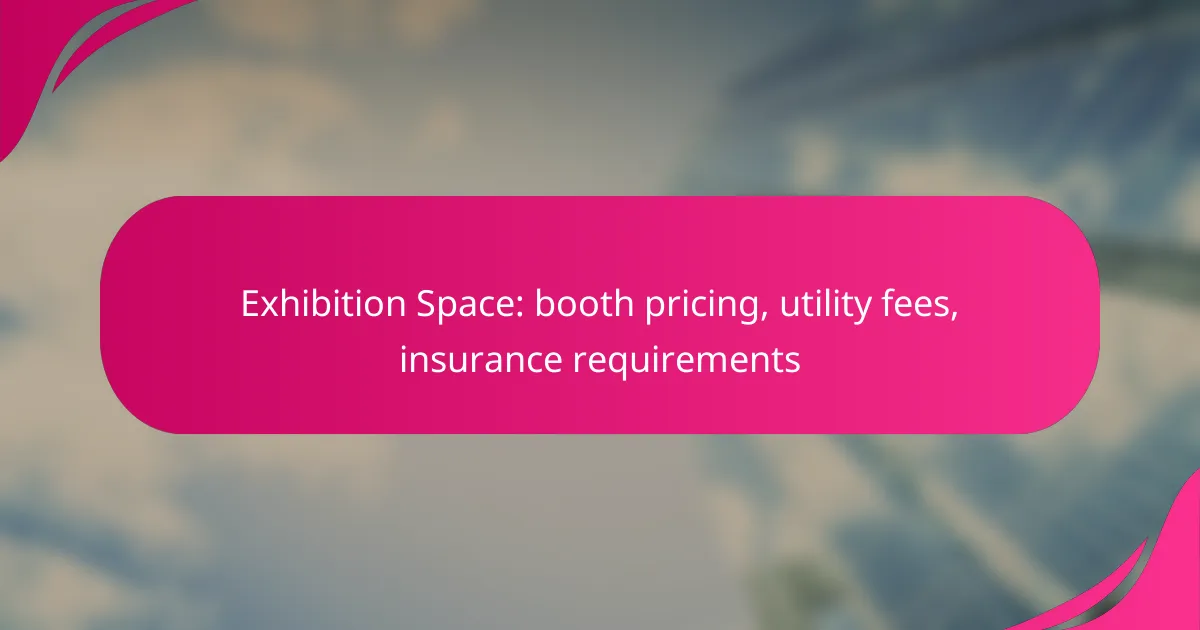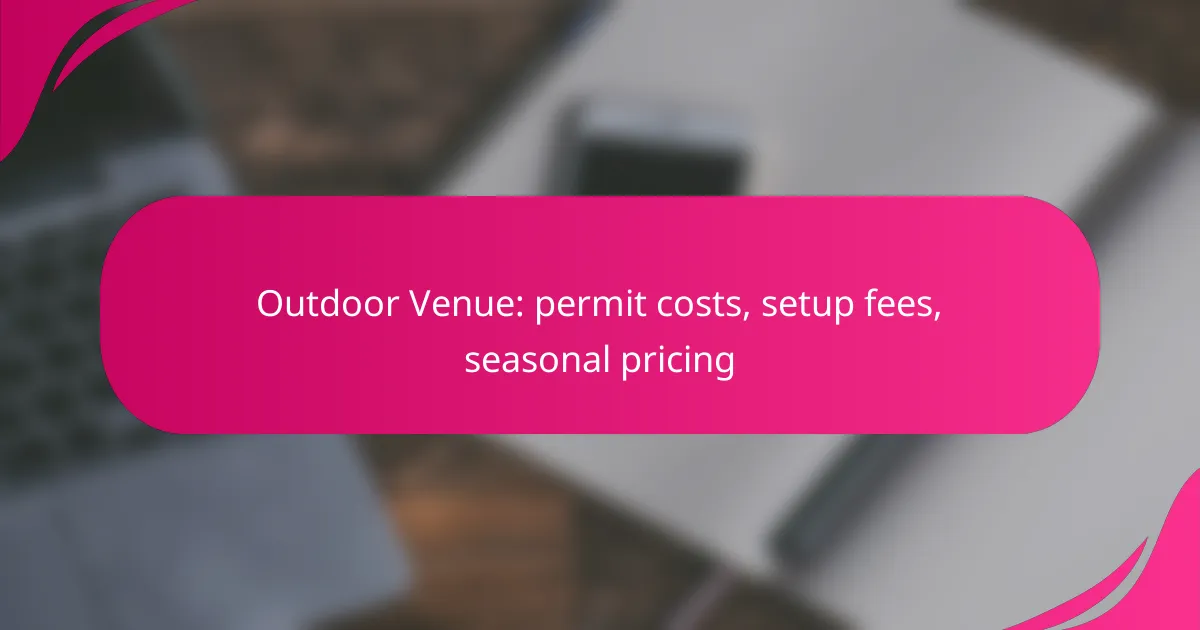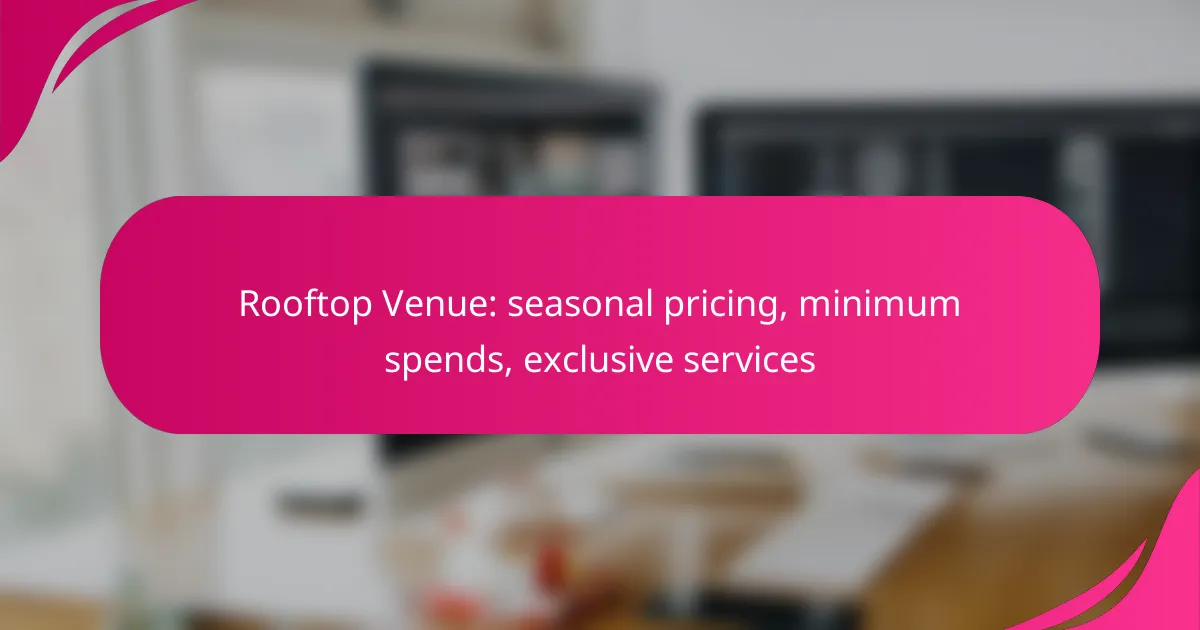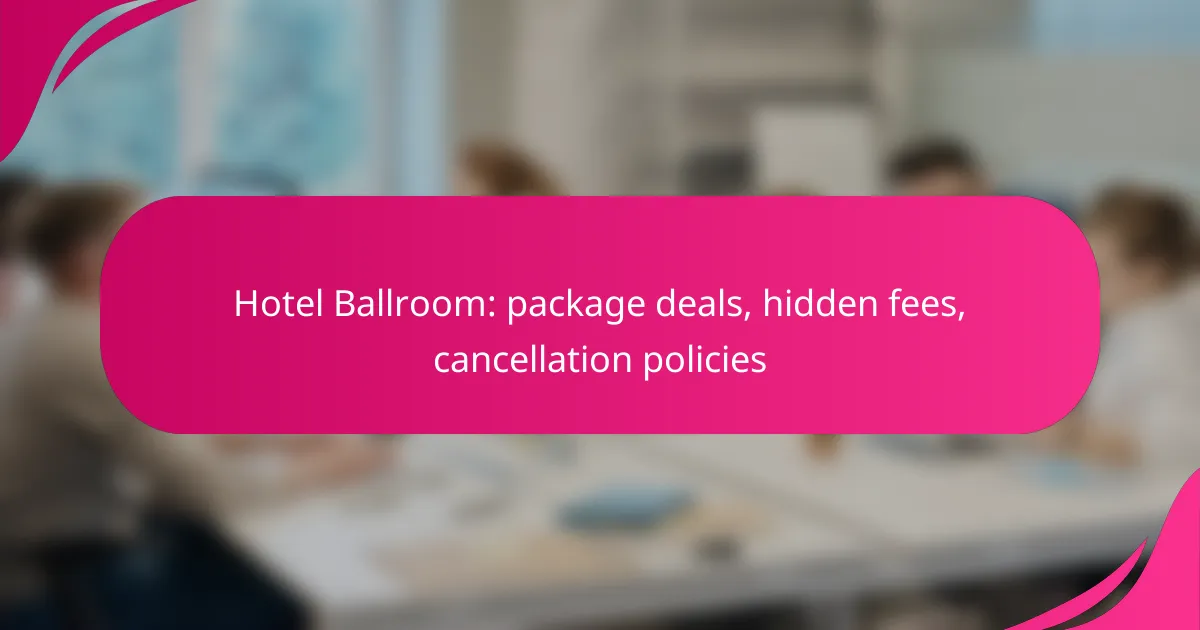When planning for an exhibition, understanding booth pricing is essential, as costs can vary significantly based on location, size, and available amenities. Additionally, exhibitors should be prepared for various utility fees, including charges for electricity and internet access, which can add to overall expenses. It’s also crucial to secure the necessary insurance coverage to protect against potential liabilities, including public liability and property insurance.
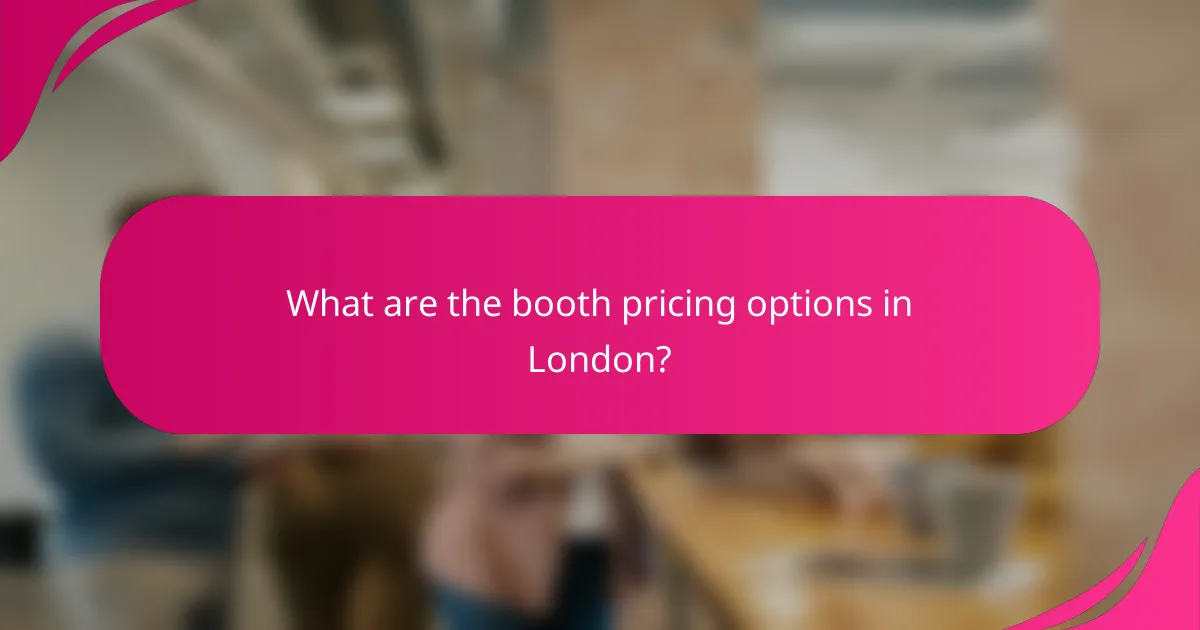
What are the booth pricing options in London?
Booth pricing options in London vary based on location, size, and amenities. Exhibitors can choose from standard, premium, or custom designs, with early booking discounts available to reduce costs.
Standard booth pricing
Standard booth pricing in London typically ranges from £2,000 to £5,000, depending on the exhibition’s scale and location. These booths usually include basic amenities such as lighting, signage, and a table.
When opting for a standard booth, consider the visibility and foot traffic of the area. Choosing a location near entrances or high-traffic zones can enhance your exposure without significantly increasing costs.
Premium booth pricing
Premium booth pricing can start around £5,000 and go up to £15,000 or more, offering enhanced features like larger spaces, custom designs, and additional services. These booths often come with better positioning within the exhibition hall.
Investing in a premium booth can lead to higher engagement and better brand visibility, making it a worthwhile option for businesses looking to make a strong impact.
Discounted rates for early bookings
Exhibitors can often secure discounted rates for early bookings, which may offer savings of 10-20% off standard pricing. These discounts incentivize early commitment and help organizers manage space effectively.
To take advantage of these rates, plan your participation well in advance. Monitor deadlines for early bird pricing to ensure you don’t miss out on potential savings.
Pricing for custom booth designs
Custom booth designs in London can vary widely in cost, starting from around £5,000 and potentially exceeding £20,000 based on complexity and materials used. Custom booths allow for unique branding and tailored layouts that can attract more visitors.
When considering a custom design, factor in additional costs such as installation, dismantling, and any required permits. Collaborating with experienced designers can help optimize your investment and ensure compliance with exhibition regulations.
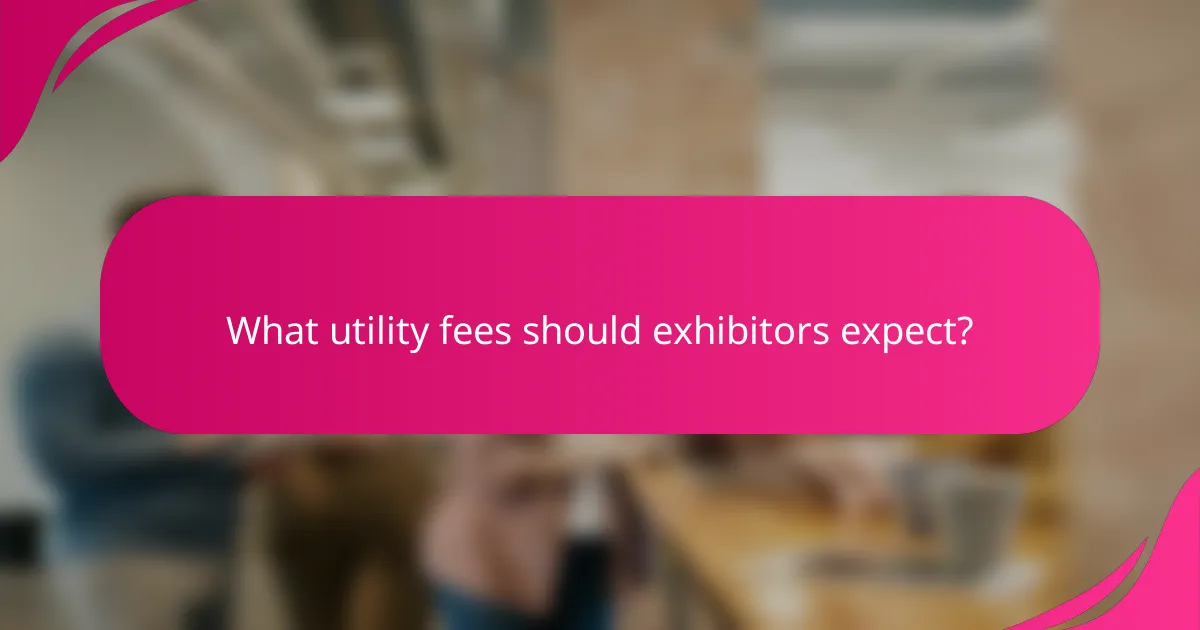
What utility fees should exhibitors expect?
Exhibitors should anticipate various utility fees that can significantly impact their overall costs. These fees typically include charges for electricity, internet access, and water supply, each of which can vary based on the venue and specific requirements of the exhibition.
Electricity fees
Electricity fees are often based on the amount of power consumed during the exhibition. Exhibitors may be charged a flat rate or per kilowatt-hour, depending on the venue’s pricing structure. It’s essential to estimate your power needs accurately to avoid unexpected costs.
For small booths, electricity fees might range from a few dozen to a few hundred USD, while larger setups requiring more power could see costs in the low thousands. Always check the venue’s guidelines for specific rates and available power options.
Internet access fees
Internet access fees can vary widely based on the type of connection and bandwidth required. Many venues offer basic Wi-Fi for free, but exhibitors often need a dedicated line for reliable service, which usually incurs additional charges.
Costs for dedicated internet access can range from around 100 USD for basic service to several hundred USD for high-speed connections. It’s advisable to book internet services in advance to secure the best rates and ensure availability.
Water supply fees
Water supply fees are typically charged for access to water lines for booths that require plumbing for displays or demonstrations. These fees can vary based on the volume of water used and the complexity of the setup.
Exhibitors should expect to pay anywhere from 50 to several hundred USD for water supply, depending on the venue’s pricing model. It’s crucial to confirm the availability of water connections and any associated costs well before the event.
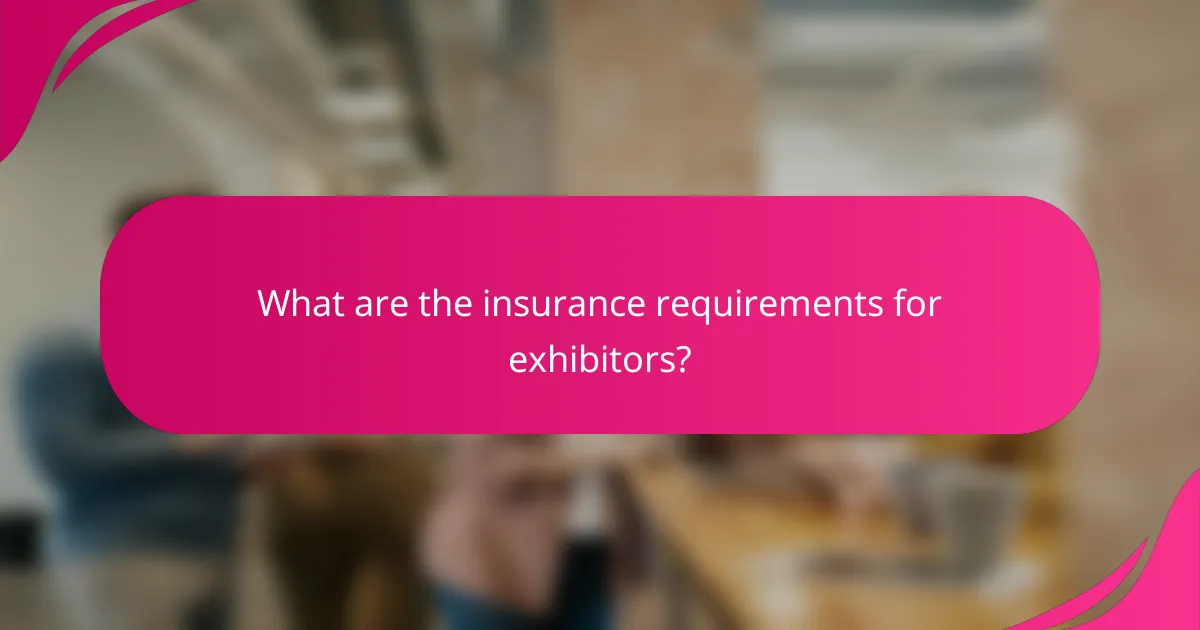
What are the insurance requirements for exhibitors?
Exhibitors typically need to secure various types of insurance to protect against potential liabilities and losses during an event. These requirements often include public liability insurance, property insurance, and event cancellation insurance, each serving a distinct purpose.
Public liability insurance
Public liability insurance is essential for exhibitors as it covers claims made by third parties for injury or damage caused by your exhibit. This type of insurance helps protect against legal costs and compensation claims, which can be significant. Most venues require a minimum coverage amount, often ranging from hundreds of thousands to millions of dollars.
When selecting a policy, consider the specific risks associated with your exhibit, such as the potential for accidents or injuries. It’s advisable to review the venue’s insurance requirements closely to ensure compliance.
Property insurance
Property insurance protects your exhibit’s physical assets, including displays, equipment, and promotional materials, from theft, damage, or loss. This coverage is crucial, especially if you are showcasing valuable items or technology. Policies can vary widely in terms of coverage limits and deductibles.
Exhibitors should assess the total value of their property and choose a policy that adequately covers potential risks. Additionally, check if the venue offers any insurance options or if your existing business insurance can be extended to cover your exhibition assets.
Event cancellation insurance
Event cancellation insurance provides financial protection in case the event is canceled due to unforeseen circumstances, such as natural disasters or other emergencies. This type of insurance can cover non-recoverable expenses, including booth fees and travel costs, which can add up significantly.
When considering this insurance, review the policy details to understand what events are covered and any exclusions that may apply. It’s wise to purchase this insurance early, as it may not be available close to the event date.
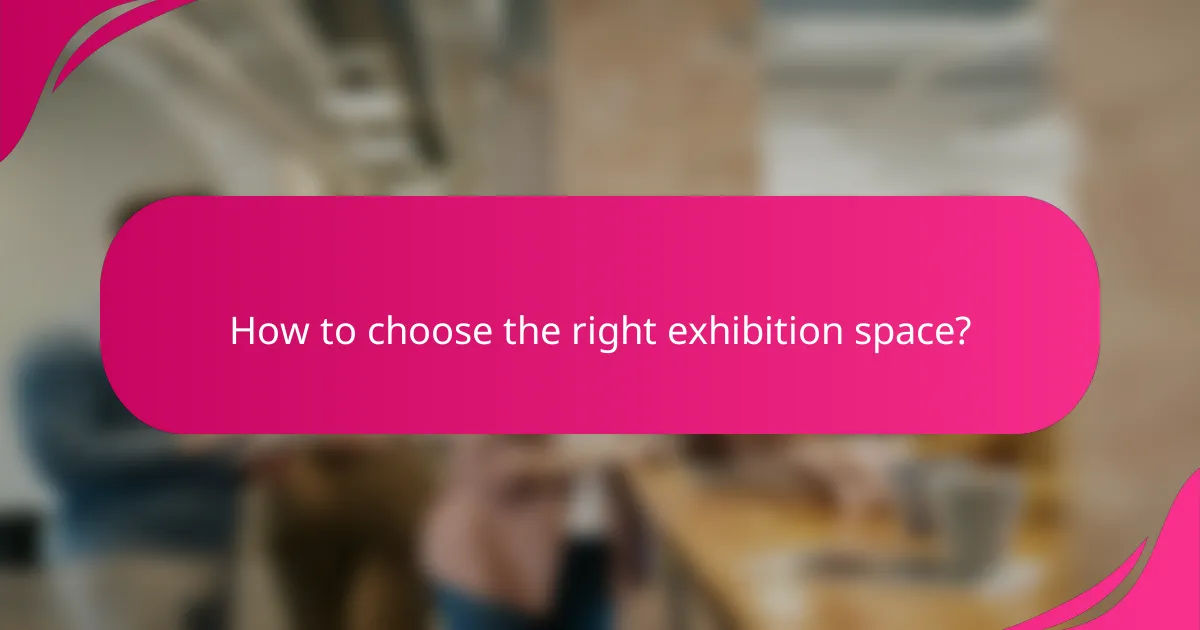
How to choose the right exhibition space?
Choosing the right exhibition space involves evaluating factors such as location, size, and accessibility to ensure it meets your needs and attracts your target audience. A well-selected space can enhance visibility and engagement, making your exhibition more successful.
Location considerations
The location of your exhibition space is crucial for attracting attendees. Look for venues that are easily accessible by public transport and have ample parking options. High foot traffic areas, such as city centers or popular convention centers, can significantly increase visitor numbers.
Consider the surrounding amenities as well. Nearby hotels, restaurants, and attractions can enhance the experience for exhibitors and visitors alike. Research local events that may coincide with your exhibition to avoid competition and maximize attendance.
Space size requirements
Determining the appropriate size for your exhibition space is essential for accommodating your booth and expected visitors. Assess the number of exhibitors and the layout you envision; a common guideline is to allow at least 10 square meters per exhibitor for comfortable movement.
Keep in mind that larger spaces may incur higher costs, including booth pricing and utility fees. Balance your budget with your space needs, and consider flexible layouts that can adapt to various crowd sizes.
Accessibility features
Accessibility is a key factor in choosing an exhibition space, ensuring that all attendees can participate comfortably. Look for venues that comply with local accessibility regulations, such as ramps, elevators, and designated seating areas for individuals with disabilities.
Additionally, consider features like clear signage and assistance services. Providing a welcoming environment for everyone not only enhances the experience but also reflects positively on your brand.
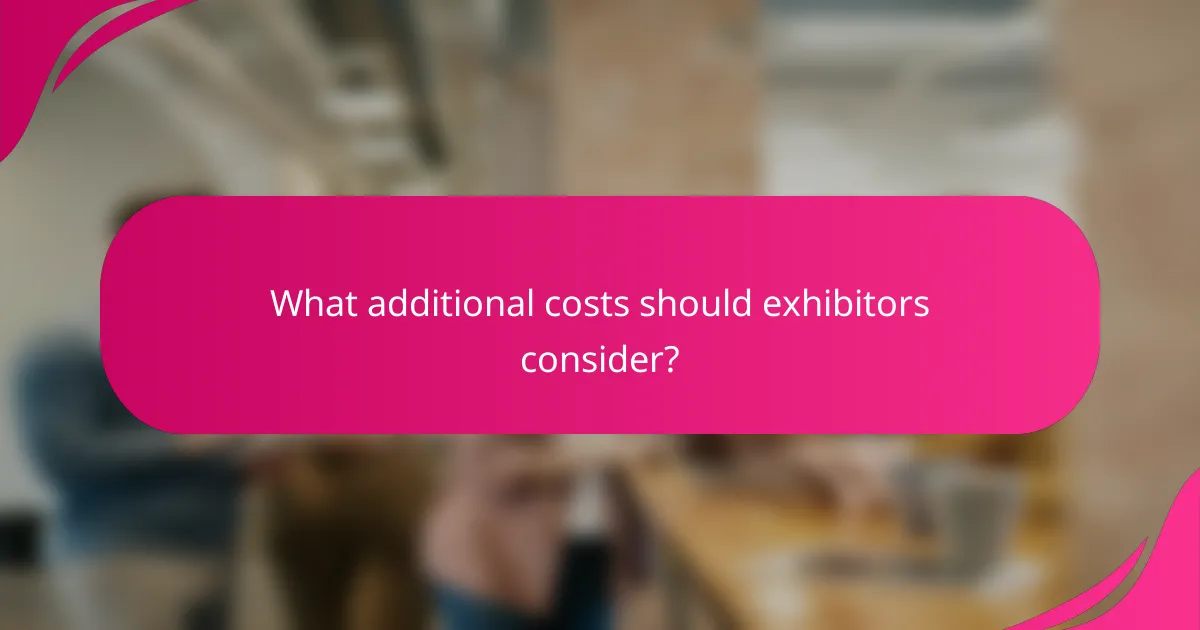
What additional costs should exhibitors consider?
Exhibitors should account for various additional costs beyond booth rental, including setup and teardown expenses, staffing, utility fees, and insurance requirements. Understanding these costs can help in budgeting effectively for a successful exhibition.
Setup and teardown costs
Setup and teardown costs encompass expenses related to assembling and disassembling your booth. These can include labor fees for workers who help with the installation and removal, as well as any equipment rental needed for the process.
Typically, these costs can range from a few hundred to several thousand dollars, depending on the complexity of your booth and the exhibition’s location. It’s advisable to check with the event organizer for specific rates and any deadlines for scheduling labor to avoid last-minute charges.
Staffing expenses
Staffing expenses involve the costs of hiring personnel to manage your booth during the exhibition. This includes wages for temporary staff, travel expenses, and accommodations if the event is out of town.
When budgeting for staffing, consider the number of staff needed based on booth size and expected foot traffic. A common practice is to allocate around 10-20% of your total exhibition budget for staffing, ensuring you have enough personnel to engage visitors effectively.
